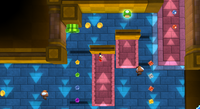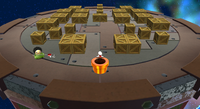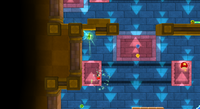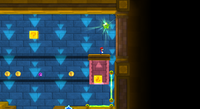Upside Dizzy Galaxy
Template:Galaxybox Upside Dizzy Galaxy is a Galaxy in Super Mario Galaxy 2, located in World 5. It is similar to the Rightside Down Galaxy, as it features heavy use of shifts in gravity. The direction of the gravity in this level can change depending on the direction of the arrows that are seen in the background. A similar concept was seen in Bowser's Dark Matter Plant from Super Mario Galaxy. Paragoombas are frequent enemies in this galaxy.
Planets
Upside Dizzy Planet (Starting Planet)
The main planet visited in this galaxy. Its outer part is shaped like a castle, and a Warp Pipe leads to the interior, where the gravity constantly changes. The inside of this planet is a series of corridors and obstacles which must be navigated whilst also watching for the change in gravity.
Crate Incineration Planet
After using a hidden Orange Warp Pipe, Mario will appear on this planet. It is shaped like a big bowl and is inhabited by a Gearmo, similar in appearance to the platform that appeared in Rightside Down Galaxy's mission, The Great Crate Incinerator, earlier in the game.
Enemies
Missions
| Level | Image | Summary |
|---|---|---|
| A Walk on the Weird Side | 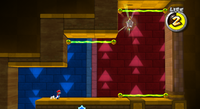
|
This mission's objective is to navigate the gravity chambers. |
| Burning Upside Dizzy | 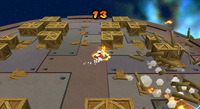
|
This mission's objective is to use a Fire Flower to burn crates. |
Green Stars
Green Star 1
The first Green Star is found on the Starting Planet, about halfway up the course. It is hidden to the left in the blue region, near two moving pink regions. In order for the player to obtain the star, they must jump down the pink to fly upwards, and with the right time, they will land in the moving pink to continue their flight upwards, landing onto the star.
Green Star 2
The second Green Star is located just a little past the first Green Star in the Starting Planet. It is in the top corner of the blue region. The player must climb on top of the platform that is above the moving pink region, and wait for the pink region to move to the far right to be in range of the Green Star. Now the player must simply Wall Jump or Backflip to obtain the star.
Music
Gallery
Mario near a Warp Pipe, Paragoomba, and 1-Up Mushroom
Mario near the ! Switch
Mario at the beginning of the second half of the stage, near some Slurples
Mario near an Electric Fence.
Names in other languages
| Language | Name | Meaning | Notes |
|---|---|---|---|
| Japanese | はちゃめちゃ引力ギャラクシー[?] Hachamecha Inryoku Gyarakushī |
Razzle-Dazzling Gravity Galaxy | |
| German | Schwindelschwank-Galaxie[?] | Fluctuating Dizziness Galaxy | |
| Italian | Galassia Calamita[?] | Magnet Galaxy | |
| Korean | 엉망진창 중력 갤럭시[?] Eongmangjinchang Junglyeog Gaelleogsi |
Hodge-Podge Gravity Galaxy | |
| Spanish (NOA) | Galaxia Mansión Sube y Baja[?] | Seesaw Mansion Galaxy |
Trivia
- On page 201 of the Prima Guide of Super Mario Galaxy 2, it has a possible early location or error of the Green Stars in this galaxy. In the guide, it shows that the location of Green Star 2 is actually Green Star 1, and Green Star 2 is right near the end of the course, though this was likely an error.
- This is one of four galaxies in Super Mario Galaxy 2 in which the Wii Remote forewarns the player of upcoming obstacles, the other three being the Beat Block Galaxy, the Flipsville Galaxy, and the Battle Belt Galaxy.
- When Mario is flying towards the Starting Planet, the Crate Incinerate Planet can be seen behind the Starting Planet. However, upon visiting the Crate Incinerate Planet the Starting Planet cannot be seen despite its close proximity but the interior of the starting planet can be seen

